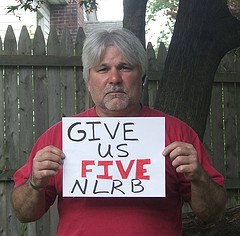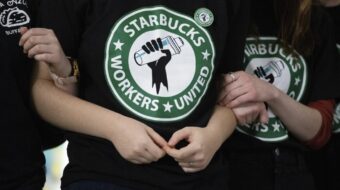
The U.S. Supreme Court ruled against the president and supporters in the labor movement today by restricting the ability of the White House to fill vacant government positions before getting full Senate approval.
In a ruling that will apply to future presidents, the court decided in a 9-0 vote that three vacancies President Obama filled on the National Labor Relations Board in 2012 were illegal. Obama made those appointments while the Senate was, for practical purposes, in recess. It was conducting no business. However, Senate Republicans used a parliamentary maneuver to keep the Senate in “pro-forma” session so they could continue filibustering Obama’s NLRB appointments.
The filibuster of the NLRB appointees prevented workers across the nation from exercising basic rights – everything from filing complaints against employers to setting up union elections at their work sites.
The immediate impact of the ruling today is somewhat blunted because Democrats, who currently control the Senate, put through a rule change last November that made it harder for Republicans to block the president’s nominees. An agreement worked out in the Senate in July 2013 opened the way for the confirmation of all five NLRB members.
Those changes came, however, only after a major campaign led by organized labor – a campaign that saw union members take to Capitol Hill to demand that lawmakers “Give Us Five” NLRB members.
“We’re not going to just be hopeful that Senate Democrats do the right thing,” Communications Workers of America President Larry Cohen said in May 2013. At the Health, Education, Labor and Pensions Committee hearing on the NLRB nominations activists wore red buttons and stickers reading, “Give Me 5 NLRB Members.”
Obama, who has been the most filibustered president in American history, made the recess appointments in an attempt to stop GOP sabotage of the NLRB and its vital role in protecting U.S. workers. The National Labor Relations Act, which says that it is the role of the U.S. government to encourage the exercise of collective bargaining rights, established the board in the 1930s.
“The board is the only place workers can go to if they have been treated unfairly and denied basic protections that the law provides,” said Sen. Tom Harkins, D-Iowa.
Although the ruling today does not remove any of the board’s five members, it will force the board to take the time to reexamine all the decisions that were made while the temporary appointees were in office.
From the purely legal angle the case was one of determining when the Senate is or is not in formal recess because only then does the president’s power of recess appointments kick in. The court, in its ruling, strictly limited the legal definition of recess, therefore sharply reducing the number of times a president can make recess appointments.
The court did not go as far as some had feared it might. It did not try to cut back on the power of the president to make recess appointments in between Senate sessions or recesses during a legislative session.
The case, Noel Canning vs. NLRB, was one in which the soft drink bottler challenged an NLRB ruling against it. The company said the ruling was invalid because some of the NLRB board members on the panel that issued it had been improperly placed there by Obama.
Anti-Obama Republicans, the U.S. Chamber of Commerce and other big business outfits campaigned hard, demanding the court back up the company.
The administration and its supporters in the labor movement and elsewhere pointed out that similar recess appointments had been made by other presidents dating all the way back to George Washington.
The ruling could become a real problem for the president if the GOP were to gain control of the Senate in November. They would be in a position to make it more difficult for the president to make appointments of his choosing for the last two years of his term.
Photo: CWA Facebook page












Comments